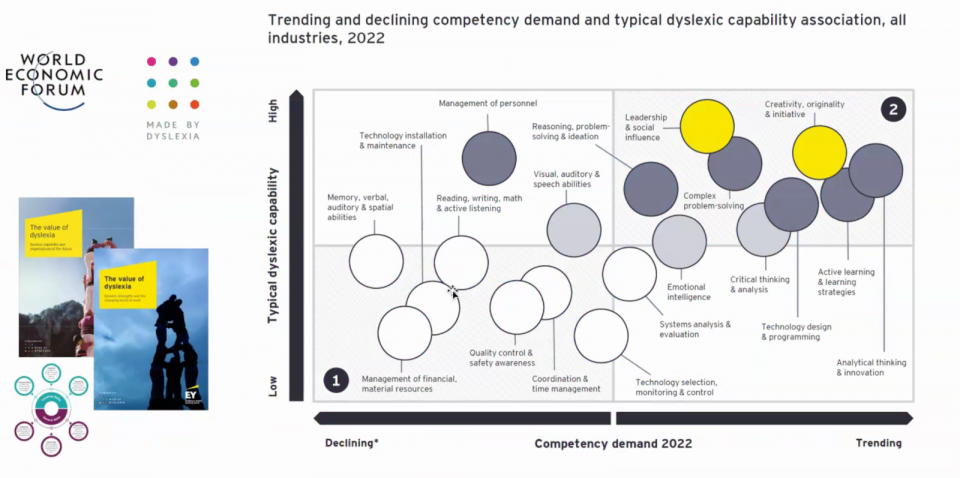Neurodivergents: The Future of Work
Anyone who has heard me present on neurodiversity will know I am a fan of the work Made By Dyslexia did which compares the future forecast for skills and typical dyslexic/neurodivergent strengths. This was based on the projections for in demand skills for 2022 from the world economic forum and analysis of neurodivergent (ND) strengths and weaknesses.
The Made By Dyslexia visual is stunning. AI/ML/automation results in a reduced demand for memory, spelling, maths, and time management. These are things many ND folks struggle with but computers are really good at. I can remember my maths teacher in the 80’s drilling times tables as “you won’t always have a calculator in your pocket” – well guess what – I do always have a calculator in my pocket*. And a spreadsheet app on my laptop.
There was a forecast for increased demand in creativity, complex problem solving, and active learning – skills many ND folks are naturally strong in.

I talk about this report so much as it helps move beyond a ND superpower model to a model where we can think about the strengths that ND folks (and NTs too) might have. It allows us to consider how with technology or in a blended team individuals weaknesses can be mitigated. You don’t build an amazing orchestra by getting a load of violin players and then getting them to diversify into other instruments, so you have a team of all-rounders.
I also like how I can see how elements have come true. Grammarly checks my spelling and can also give guidance on tone. I can even get ChatGPT to rewrite stuff to make it more formal/confident/warm/friendly.
The downside is talking about the future skills of work for 2023 which is now in the past.
So it’s great to see the World Economic Form projection for skills in 2025 (https://www.weforum.org/agenda/2020/10/top-10-work-skills-of-tomorrow-how-long-it-takes-to-learn-them/) The top 5 in demand skills
-
analytic thinking and innovation
-
active learning and learning strategies
-
complex problem solving
-
critical thinking and analysis
-
creativity, originality and initiative
These map nicely to ND nature strengths or skills learned as a result of compensation learning. Malcolm Gladwell has written on compensation learning – in short it’s stuff that is learned to compensate for innate weaknesses. Skills learned through hardship. I suffer from time blindness – there is the past, now, the imminent future (next task, next meeting) and then a big blob of the future. An hour away, a week away, a year away: it’s all the same because it’s not now or next. Yet I’m I project manager. That’s because I learned that to cope, I needed to break tasks down, to schedule them, to respond to unexpected events – all skills that are core to being a PM. It’s not a natural talent it’s a coping strategy. Compensation learning in practice.
Taking this one step further it was great to see an article by Professors Almuth McDowall and Nancy Doyle** in People Management. They did some work with Neurodiversity in Business. They obtained data from well over one thousand people, which included 990 employees and 127 employer representatives. Employers and employees agree that neurodivergent talent is marked by hyperfocus (80 per cent), creativity (78 per cent), innovative thinking (75 per cent), detail processing (71 per cent) and authenticity (64 per cent). These map to the WEF forecast for skills in demand in a parallel to the earlier work by Made By Dyslexia.
Their research wasn’t all good news – there are low levels of wellbeing in ND folks with stigma and lack of knowledge being key barriers to enabling top performance. Many ND folks are considering leaving their organisation with the provision of (or lack of) workplace adjustments correlating to wanting to stay (or go).
Line managers were reported as the first port of call for identifying support by both employees and employers, yet they are unlikely to have specialist training. This matches the internal assessment by Think Differently and the Autism Support Group – manager awareness and training are key. I’ve had a really tough couple of years but the reason I’m still working here is simply because I have an amazing line manager.
So tl;dr*** ND folks have in demand skills. To gain business benefits from those skills workplace adjustments need to be in place to create an environment where they can perform at their best. Where adjustments are not in place ND folks are likely to leave and find a place where that can work effectively. Line managers are key to this equation but many of them are unaware and untrained.
——-
*ok not in the office as my calculator is my phone which I try not to use in the office as it is a source of infinite interesting things vying to steal my attention. My phone is also my reminder of where I am supposed to be when. And also my enhanced external memory store.
**I must admit to having a bit of a professional crush on Nancy – she keeps publishing amazing research and articles on the topic of neurodiversity and they all have insightful takeaways.
***Can you put tl;dr at the bottom??

